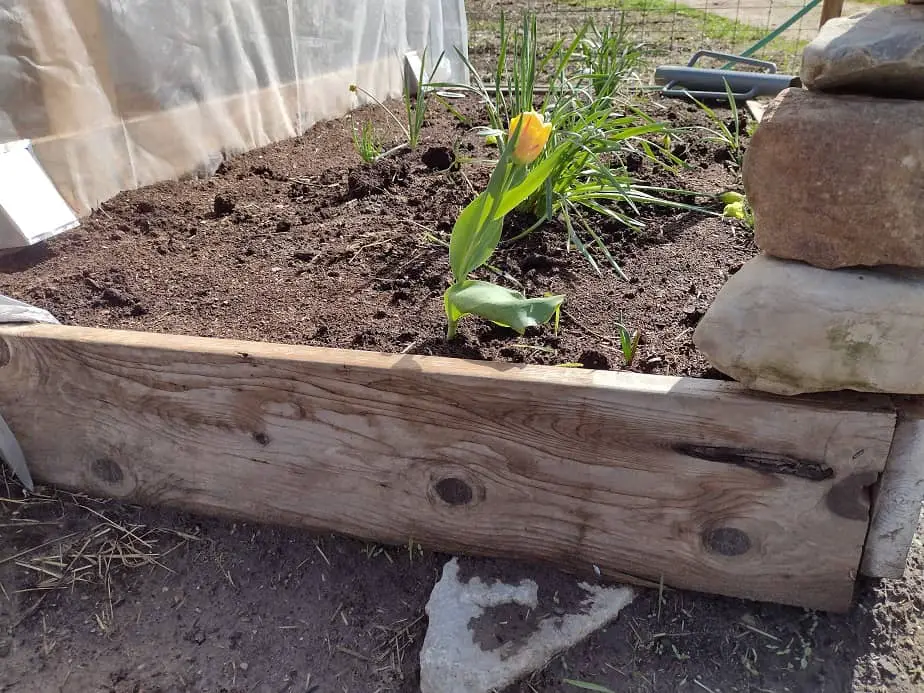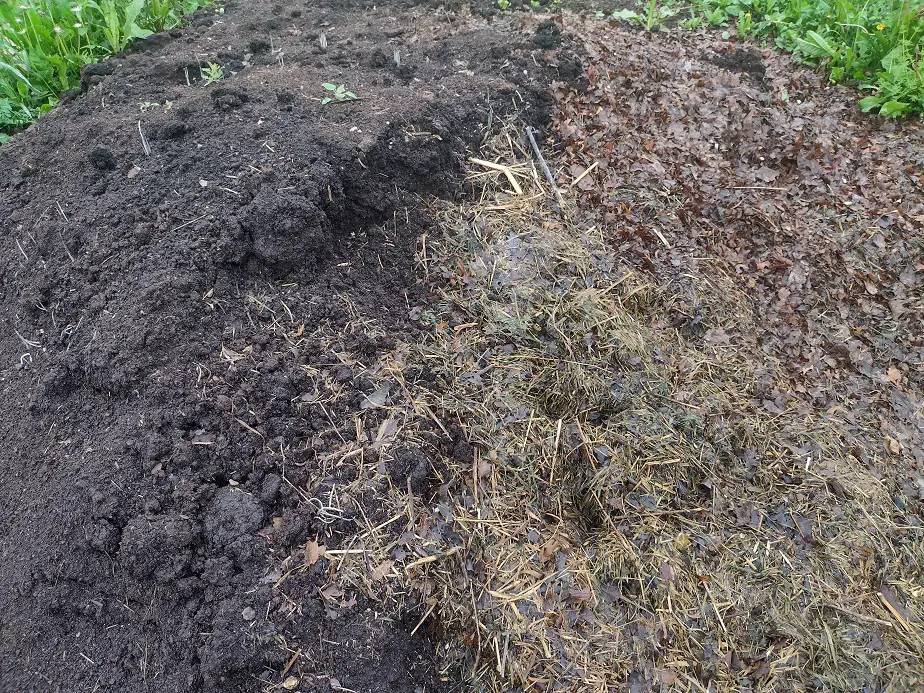It took me a few years to learn the importance of compost in a garden. Now, I won’t do without it.
Start with a few inches of compost and add an inch every year. Raised beds should be at least 20 percent compost. Most bagged soil comes with enough compost already, but still needs some added each year. If using topsoil, add 2 bags, or 2 five-gallon buckets, of compost per 4 cubic feet of soil when making the bed.
Compost is natural soil organic matter. Soil organic matter is the 1 thing that feeds healthy soil. Let’s talk about the different ways of using compost and just why it’s essential.
Here’s Why Compost (organic matter) is so Important
Raised beds have a limited area from which to draw nutrients for the plants. Plants have a big appetite, and they need a lot of plant nutrients. That meant we as gardeners need to create a super-fertile environment in order for a raised bed to grow strong, healthy plants.
A raised bed needs compost in order to feed plants, allow bacteria to convert fertilizer into usable forms, and to store up soil fertility. Compost also greatly improves the water holding capacity of the soil, keeping it from drying out. Compost causes soil to function properly. Without compost, soil dies.
That may seem eccentric, but it’s true. In nature, the soil is always trying to create its own compost from decomposing plant matter. As plants die off, the plant matter falls where it stood. It’s broken down by bugs and bacteria to become a little bit of compost.
Soil fertility can be simply called energy. Plants take in energy from the soil and energy from the sun. They die, and a little of that energy goes back into the ground if you leave the plant matter in place. The more and larger the plant matter, the more energy it puts back into the soil. That’s how soil becomes fertile.
In farming, it’s hard to put a lot of organic material into the soil. In gardening, it’s easy. Just use some compost. Seriously, you can add in one season which would take 70 years to accumulate in nature, and it’s not at all harmful.
You may remember from high school chemistry about the “carbon bond”. Carbon is always trying to bond with other elements, and it creates a very strong bond that takes a long time to break down. The organic matter of the soil (mainly carbon) holds onto all the nutrients plants need.
It stores food for both plants and beneficial soil microbes in a stable form, like a soil retirement account. If the soil isn’t tilled up, the organic matter breaks down slower than it’s created. Every year, the soil retirement gets its contributions, and every year the interest it puts out gets a little higher.
Eventually, it gets to the point where it’s self-sustaining. With a smaller garden, we can do that in one swift move. Add a lot of quality compost, practice good crop rotation, and cover cropping. Depending on the nutrients your compost is holding, you may need to add a little something now and then.

What is the Ratio of Compost to Soil for a Raised Bed?
Raised beds are usually recommended to have at least 20 percent compost, by volume, mixed into the soil. MI Gardener, a well-known and skilled gardener on Youtube, prefers nothing but compost, with a bit of perlite added for drainage. His garden grows amazing plants!
If you but bagged garden soil or raised bed soil, it should already have plenty of compost mixed in, but it would be smart to always add a bit every year so that as it breaks down, it’s never depleted. Depleted, once fertile dirt is depressing. I’ve seen a lot of it in my area.
Most fields once rich and black, are now dry and sandy. It’s a sad sight to see soil that has had the life worked out of it and now can’t produce anything without constant chemical treatments. We can do better. We should do better.
In your garden, just sprinkle compost on top of the dirt. You don’t have to till or mix it in. Nature will do that over time. The more you till and mix the dirt, the faster the organic matter decomposes because you’re oxygenating it. As much as you can, try to implement a no-till approach. It works.
Mulching your bed can relace the annual compost adding. Materials like grass clippings and fallen leaves make an exceptional mulch that adds a lot of quality fertility. I love a 50-50 mix of both, that’s my favorite. Natural woodchips can work too, but they will need some fertility added because they are low-nitrogen.
Not all compost is created equal. Good compost will be higher in Nitrogen. If you have low-nitrogen compost, and most are, it just means you need to use a nitrogen-containing fertilizer. Grass clippings are higher in nitrogen, and fallen leaves are high in all the trace minerals that plants need. It’s a good combo.

Can You Fill a Raised Bed With Just Compost?
You can fill a raised bed with just compost if it’s quality compost. If you get a lot of rain, you should add some peat moss or contractors’ sand to improve drainage. Pure compost generally needs a low-phosphorus fertilizer, as it usually already contains a lot of phosphorus.
Most compost is made from woodchips, municipal waste, shredded bark, sawdust, fallen leaves, and grass clippings. Generally, it had an NPK of around 0.2-1-1 or so. Most of the time bagged or bulk compost doesn’t come with an NPK rating. That probably means it’s nothing special.
Companies that put in the effort to make high-quality compost will put it on the label; they want you to know it. Do read the label, especially the ingredients. Sometimes manufacturers will add fertilizer to compost to boost the NPK. Not necessarily a bad thing, but you may want to know.
There are concerns about compost made from municipal waste. It generally contains a lot of plastic particles and can be a bit high in residual chemicals from medications. Not everyone shares that concern. I do believe Miracle-Grow compost and soil is made from municipal waste; sewage crud.
How Many Bags of Compost do I Need for a 4-8 Raised Bed?
Use at least 4 bags of compost in a 4-8 raised bed. That will make a 3-inch layer. If you are planning on mixing compost with topsoil to fill the bed, use 4 bags per 10-inches of bed height. You should add 1 or 2 bags every year to the top of the raised bed for maintenance.
How Much Compost Per Square Foot?
Add a quarter bag, 2-gallons, of compost for each square foot of the 12-inch deep raised bed. For in-ground gardens, start with at least one gallon of compost per three square feet (an inch deep), then add the same amount every year To maintain it.
Related Articles:

